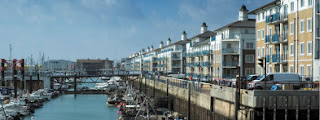Top Tips for buying an overseas property
Buying a property abroad is an exciting prospect, but one important rule applies - don't let your heart rule your head. The principles you would stick to in the UK also apply when buying overseas.
Follow Conti's 'Top Tips' to ensure that your buying experience is as hassle-free as possible.1. Contracts
Never sign a contract that you do not understand (e.g. if it's in a foreign language). If two versions are provided, i.e. English & local language, ask your solicitor to confirm the English version is a true translation.
Always read the contract! Ensure you are fully conversant with the terms and conditions you are about to agree to. Specific points to be clear about include:
- What deposit is required? Is it refundable and under what circumstances?
- For new properties, what stage payments are required and when?
- What is included in the price and what is the cost of the extras?
- Check the due completion date
2. Arranging Finance
If you require mortgage finance, obtain an 'Agreement in Principle' for your mortgage before agreeing to purchase the property, or before signing any contracts and paying a deposit.
If you are arranging finance on the property, ensure that this is stated in any contract and, where possible, seek an 'opt-out clause' if the loan is not agreed (which will ensure any deposit paid is refunded).
Remember your overseas mortgage will probably be in the local currency and you must consider the impact of fluctuations in exchange rates. However, if the intention is to receive rental income from the property, this may be in the local currency.
3. Specialist Advice
Always ensure that you seek specialist advice from independent solicitors, valuers, architects and surveyors before considering a purchase overseas. They should be proficient in your chosen country's laws and processes and also know the specifics involved in buying a property there. It is essential they confirm to you that all required permissions, licences and planning consents have been obtained.
4. Valuation
Before proceeding with the purchase (especially with a re-sale property, regardless of age), ensure an independent valuation of the property is carried out, which should point out any problems with the property - e.g. subsidence, damp, wiring defects - and could also highlight any possible boundary disputes.
5. New Build
If buying from a developer, what's their track record and how long have they been trading? Are references available from previous buyers? Check comparable properties in the area and any re-sales offered on the same development.
If the developer mentions 'rental returns', what are these based on? Check they're feasible and have been achieved in the past.
Before making any commitment, try to give yourself a `cooling off` period if you see a `must-have' property and are tempted to put down a deposit there and then. You must be sure that you're making the right choice.
6. Title/Property Ownership
Does the developer or seller have full title to the land or property? Ensure you do not inherit a debt on the property before you purchase, which your solicitor should also be able to check. For example, if the developer has borrowed money to build the development and this amount has been allocated against each plot as additional security to the developer's bank.
7. Location, Location, Location
Conduct thorough research about local facilities and transport. People gravitate to locations with a nearby airport, especially if it's served by a budget airline. But remember there are no guarantees that cheap flights will continue indefinitely in one location. Proximity to basic facilities like restaurants, shops and a beach are also important.
Talk to people who already live/own property in the area you like to get a better understanding of what it's like to live there. And consider the property off-season - many resorts (beach and ski) are seasonal and practically shut down when the tourists return home.
8. Local Money
Open a bank account in your chosen country and, where relevant, ensure you obtain a Certificate of Importation for the money you bring in from your home country.
Set up standing orders in your local bank account to meet local bills and taxes. Failure to pay your taxes in some countries such as France, Portugal and Spain, could lead to action by the authorities.
9. Extras
Bear in mind that bills don't end at the asking price. Lawyer's fees, IVA, local and national taxes, insurance, etc must all be met in your host country and can often add at least a further 10% to your cost of acquisition. Ensure you are, therefore, aware of the costs charged by the legal and government authorities for purchasing a property in your chosen country.
10. Tax
Check the inheritance and capital gains tax laws of the country where you are buying. For example, in France your children automatically inherit rights to your house; your estate may not automatically pass to your spouse and you may, therefore, need to compile a separate will.
If you take a mortgage out on a property in France or Spain, it may reduce your inheritance tax liability as there is a debt on the property.
If you rent out your property you will be liable for income tax
Conclusion
Remember - remain clear about your objectives. You must be sure about why you're buying and what you're hoping to achieve. Is it for retirement purposes, purely for holidays, or an investment? You may be undecided, e.g. had planned to buy in Spain for holidays and eventual retirement, but now have decided to go for an emerging market like Montenegro, where you hope to profit from the investment. Can you really afford the risk associated with this change of decision?
Conti specialises in arranging mortgages secured on overseas residential property in more than 45 countries. For information, please visit www.mortgagesoverseas.com


No comments:
Post a Comment